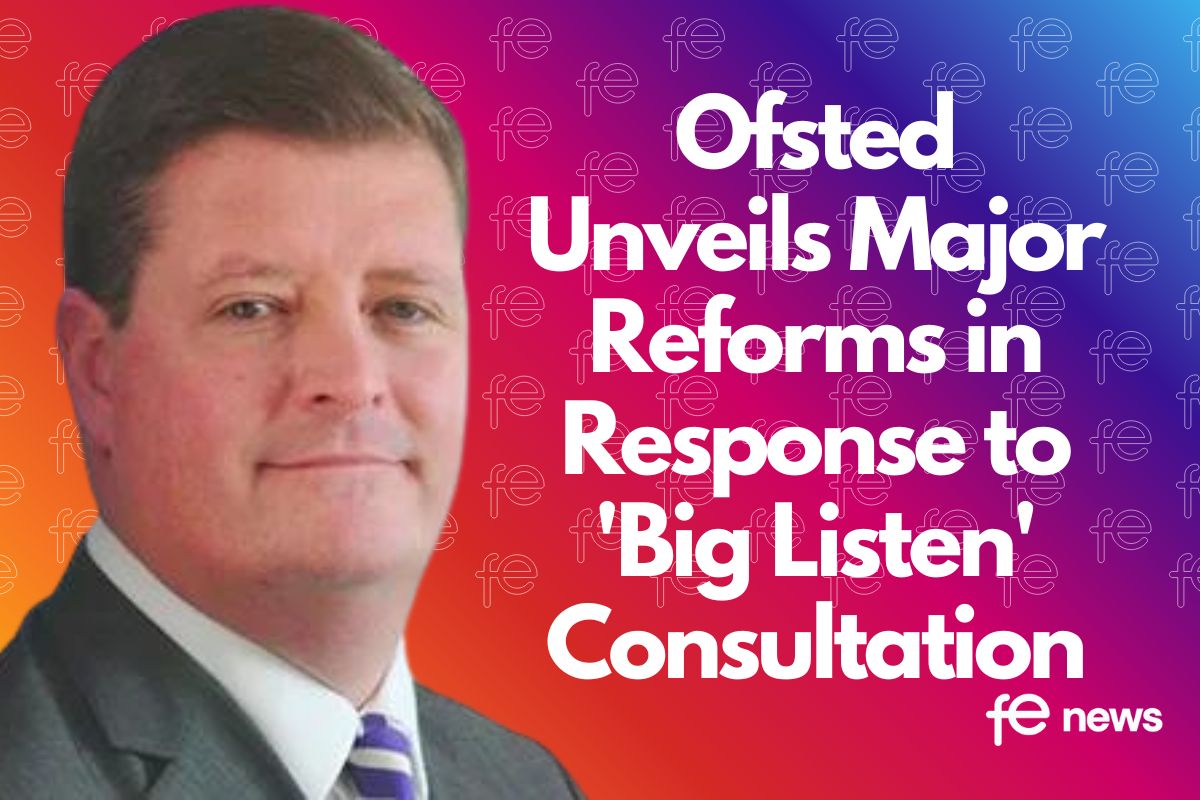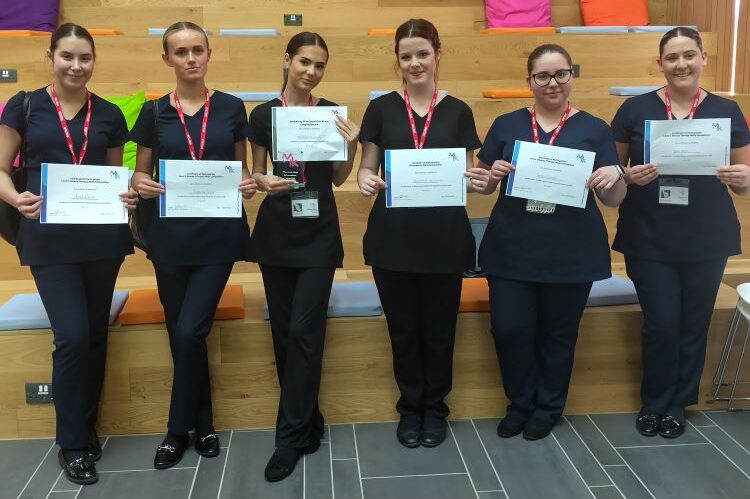Ofsted Unveils Major Reforms in Response to ‘Big Listen’ Consultation

- Chief Inspector pledges “real change” as Ofsted unveils plans to rebuild trust with all those it inspects and regulates following the ‘Big Listen’
- Ofsted commits to putting vulnerable children, such as those from disadvantaged backgrounds and those with SEND, at the heart of its reforms
- New inspection framework to have greater focus on pupil outcomes to drive higher standards, alongside a range of measures to reduce teacher stress
- The overall ‘single word judgement’ will be phased out of Ofsted inspection reports, to be replaced with a report card, as announced by government
Ofsted has today published a detailed response to its ‘Big Listen’ consultation, setting out how the inspectorate will reset its relationship with the sectors it inspects and regulates, while continuing to raise standards for children and learners.
The Big Listen is the largest consultation in Ofsted’s history. It showed broad support for Ofsted’s role – particularly from parents; but it also highlighted significant disquiet about the inspectorate from those working within education and social care. Responding to the criticism, Ofsted has announced a raft of changes and improvements to the way it works. His Majesty’s Chief Inspector, Sir Martyn Oliver, described the Big Listen as “the beginning of a new chapter” for the organisation.
Today’s report presents a rich summary of everything Ofsted was told during the consultation. The feedback included:
- Most parents agreed that Ofsted is important for keeping children and learners safe (72%), and for the quality of children and learners’ education (68%)
- More than half (51%) of parents and carers agreed that Ofsted acts in the best interests of children, while only 13% disagreed
- Most providers were frustrated with the single word judgement – with only 28% in support
- Parents and professionals support the removal of the single word judgement, with around half of parents (49%) opposed to the single word judgement and 29% strongly opposing
- More than three in five providers (61%) felt inspection placed undue pressure on their workload
- Almost half of professionals (47%) said they would be uncomfortable raising concerns with an inspector during an inspection
In response, Ofsted is making changes designed to reduce the pressure of inspection on education and social care staff, while still robustly assessing the quality of nurseries, schools, further education and social care providers.
The main changes include:
- A new inspection framework for schools, early years and further education, which will have greater focus on pupil outcomes to drive higher standards, alongside a range of measures to reduce anxiety for those being inspected. Consultation will begin in early 2025.
- Increasing Ofsted’s focus and scrutiny on how providers are meeting the needs of vulnerable or disadvantaged children and young people, by consulting on a specific focus on inclusion in report cards. The new measure comes at a time of widening outcome gaps between disadvantaged and non-disadvantaged pupils since the pandemic.
- Pausing the publication of inspection reports when safeguarding concerns are identified in an otherwise high-performing school, until inspectors re-visit the school within 3 months. This will give schools time to remedy issues without intervention from the Department for Education. Parents will still be informed about the safeguarding issues in the meantime. This change will come into effect from this month.
- Introducing a ‘report card’ in all areas Ofsted inspects, to provide a more nuanced and detailed assessment of providers’ work. This follows the announcement by the Secretary of State for Education that the single-word overall effectiveness judgement will be removed from school inspections starting this month. Report cards will be introduced from September 2025.
- Working with government to introduce new annual safeguarding, attendance and off-rolling reviews for schools, to consider how they are meeting their requirements to keep children safe. Ofsted will also consult on a new, stand-alone assessment of safeguarding in its reports.
Ofsted received more than 20,000 responses to its open online consultation, including over 4,000 from children to the dedicated children’s Big Listen. Independent researchers commissioned by Ofsted surveyed another 8,000 parents and members of the general public, and more than 7,000 professionals working across education and children’s social care. Meanwhile, unions and representative groups responded on behalf of tens of thousands of their members.
Ofsted Chief Inspector, Sir Martyn Oliver, said:
“I promised the Big Listen would be followed by real change. This is the beginning of a new chapter for Ofsted as we reset our priorities, refine our practices and rebuild our relationships. We want to retain the confidence of the children, parents and carers we work for, and regain the respect of the committed professionals we work with.
“The tragic death of Ruth Perry was a catalyst for this change, but the case for change has been building for years. We recognise the growing challenges facing education and social care, particularly since the pandemic. We don’t want to add to this pressure. Many of the changes we are introducing are aimed at reducing the pressure on those we inspect.
“We will always strive for higher standards for children, particularly the most vulnerable children. We share that aim with thousands of brilliant people working in education and social care. We are determined to win back their trust and work together in the interests of children and learners.”
Other changes include:
- Developing an Area Insights service using Ofsted’s unique position of oversight to share local data. This service will illustrate what it is like to be a child in any given area, providing better information for parents and carers about the education and social care systems their child moves through from birth to adulthood, and signalling to government the areas that need additional support.
- Launching an Ofsted Academy, aimed at supporting a positive learning culture and embedding Ofsted’s values of professionalism, courtesy, empathy and respect across the organisation. The Academy will also share best practice from the sectors Ofsted inspects and make its own training materials and processes more visible.
For schools:
- Ofsted will announce all routine inspections on a Monday, with inspections taking place over the following two days. This means leaders will know by Monday afternoon if they are being inspected that week, helping to reduce the stress of waiting. This new approach will be piloted over the autumn term.
For early years providers:
- Ofsted will streamline the registration process for early year providers to support the government’s plans to meet demand for childcare places.
- Ofsted will review how it registers, inspects and regulates multiple providers, to ensure the sector can continue meeting the demand for early years settings over the longer term.
For children’s social care providers:
- Ofsted will strengthen the regulation of the children’s social care sector in partnership with government.
- Ofsted will work with government on new legislation to enhance the regulation of social care, including oversight of children’s homes at group level and new enforcement powers to tackle unregistered settings.
Sector Reaction
Pepe Di’Iasio, General Secretary of the Association of School and College Leaders said:
“Many of the recommendations in this response, some of which are coming in with immediate effect, are very welcome. In particular, the greater focus on inclusion and SEND, better training and support for Ofsted inspectors to improve consistency of inspection, and a shift away from graded judgements reflect the views of school leaders. There are some very bold ideas in the response, including notifying all schools by Monday afternoon of the week they’ll be inspected, with all routine inspections happening on Tuesday and Wednesday; introducing area insights into the proposed new report cards, which will help contextualise school performance; and introducing six new national hubs aimed at making inspection fairer and more transparent.
“However, school leaders will understandably be concerned about the timescales and pace of reform, and whether the changes go far enough. Earlier this week, the government confirmed that new accountability report cards will be introduced from September 2025, but Ofsted have said it will only start consultation on a new inspection framework in early 2025. This comes at a time when the government is about to launch its review into curriculum and assessment, which includes changes to performance measures in its scope. There is a danger that these reforms will not be joined up, and that a rush to do something different will undermine their effectiveness.
“Ofsted certainly needs reform, and their response sets out a blueprint for what changes we can expect, but we absolutely must avoid replacing one flawed system with another one.”
Paul Whiteman, general secretary of the school leaders’ union NAHT said:
“We are pleased that the inspectorate is committing to ensuring that inspections are more tailored to the relevant phase and to improving training for inspectors. The shift to giving schools notice of routine inspections only on a Monday could be a positive step, although the feedback from the pilot will be important. These are small steps within the existing system, but more fundamental reform is now essential.
“As NAHT and others have previously pointed out, much of the quantitative data arising from the Big Listen consultation itself will be of limited value due to the way many of the questions were worded. Not only were key issues ignored, but also many of the questions were presented in a highly leading manner. The concerns we raised about this were not properly addressed. It is therefore hard to see how such data can be used to inform the design of a new approach to inspection. It is important that Ofsted has acknowledged the strength of feeling that came through the free text boxes and the recent announcement that overarching grades will be scrapped is a clear step in the right direction.”
David Hughes, Chief Executive, Association of Colleges said:
“I am pleased to see that Ofsted plans to remove single-word judgments for overall effectiveness for FE and skills inspections and replace them with a report card in the future. This will be welcomed by staff, students and parents across the FE sector but there remains a question as to why this could only be implemented immediately for schools.
“The wider reform of the FE and skills inspection framework is an important and lengthy task and isn’t one that should be rushed through so I welcome the consultation that will be launched on this, and we will be working with our members to submit a response.
“The other changes announced today – recruitment and training of FE inspectors and removing barriers of opportunity – are also positive steps forward to ensuring inspection truly supports colleges. Colleges want an inspection regime and inspectors who understand colleges, the contexts they operate in, the different types of learning they offer and the diversity of learners they support. They also want a culture in Ofsted of improvement, engagement and respect which supports colleges to be the best they can be, rather than simply offering a snapshot judgement. It is these cultural issues which I hope Ofsted embraces throughout its changes.
“The role of Ofsted to inspect higher technical qualifications needs some work with the Office for Students to ensure that this is not burdensome on colleges by creating overlapping and confusing inspection and oversight arrangements. The number of 14 to 16-year-olds studying in colleges is rising, and it’s right that this provision should be inspected. However, all inspectors should have training in the different types of 14 to 16 provision and be clear on the context and expectations for this often-vulnerable group of learners, as it will be different to mainstream provision in schools.
“We look forward to working with Ofsted on these developments, and to receiving further information on the Ofsted Academy, the updated Ofsted Code of Conduct, the national hubs, insights library and external reference groups.”
Natalie Perera, Chief Executive, Education Policy Institute (EPI), said:
“Ofsted’s response to its Big Listen and the earlier announcement of the ending of one-word judgements are both positive steps towards reforming a school accountability system that has made leadership of some of the most challenging schools even more difficult.
“The current accountability system creates perverse incentives, which can often include narrowing of the curriculum, reducing the inclusiveness of admissions practices, and removing pupils from school rolls. Ofsted’s plans to introduce a new focus on inclusion in its criteria for inspection has the potential to help counter these effects and make the school system work better, particularly for pupils from disadvantaged backgrounds or with special educational needs.
“We welcome Ofsted’s focus on vulnerable learners and pupils from disadvantaged backgrounds and look forward to their proposals for how that will be reflected in the inspection framework and the training of inspectors. Under the current system, schools with low levels of disadvantage and high prior attainment have been more likely to receive positive judgements from Ofsted. Our own research shows that when schools consistently receive ratings that are less than good it is associated with an increase in teacher turnover, and an increasingly disadvantaged intake, both of which make it more difficult to reverse the negative judgement.
“More broadly, it is right that the Department for Education and Ofsted are reevaluating how school performance is measured. Our own benchmarking tool for multi-academy trusts and local authorities, which includes measures of attainment, progress, inclusion, the school workforce, and school finances could provide a blueprint for the new school report card.”
Carole Willis, Chief Executive of NFER, said:
“We welcome Ofsted’s openness and willingness to listen and take action. The consultation response contains a number of changes which will help to improve the inspection process, and which reflect some of the changes NFER has been calling for.
“We look forward to seeing more detail about exactly how support and intervention from the government will be targeted under the new system.
“It is important report cards do not become overly complex and that any steps to reform the system are carefully designed to consider the potential wider and longer-term implications.”
Ben Rowland, Chief Executive of AELP said:
“It’s great to see that FE and skills providers, including many AELP members, were so active in the Big Listen initiative, with 23% of all respondents coming from FE and Skills. There are some really important ideas coming through, and we are pleased that there is such strong commitment to work with the sector to develop a new inspection framework and a new ‘scorecard’, that will enable us, together with Ofsted, to build on the foundations we already have in place to continuously improve how inspections work in turn so that our learners, our employers and our staff all benefit.
“AELP will continue to keep up the pressure on Ofsted to improve consistency, to improve the experience of being inspected and to ensure inspection teams have the right expertise to be able to truly add value as well as hold providers to account.”
FIN CEO Kerry Boffey said,
“Thank you to FIN members who have contributed. Ofsted has today acknowledged the voice and opinions of our members to the Big Listen. It is fantastic to see FIN members’ experiences and expertise being recognised in the actions being taken forward. The Big Listen was a significant step by Ofsted. FIN believes that from here, Ofsted have put themselves in a strong position to become more consistent in making impartial judgements.
“With Ofsted agreeing that the EIF is not working for all types of provision, we should definitely see an increase the number of inspections having a positive impact on learning.”











Responses